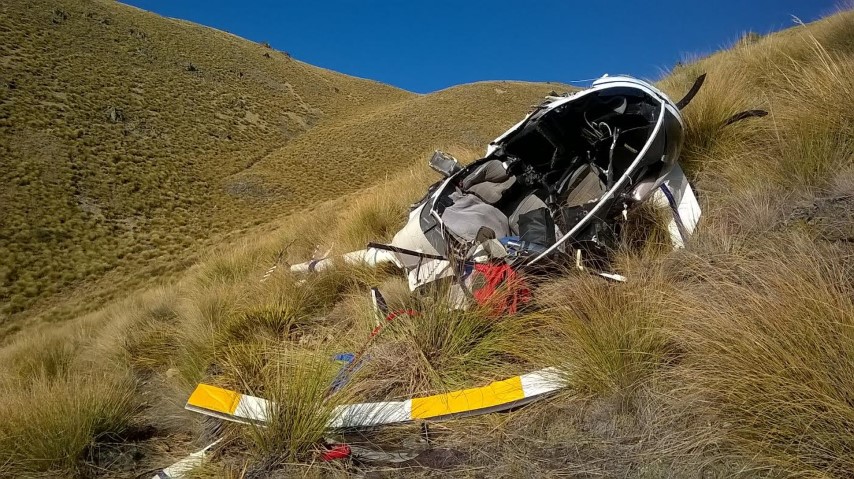
Jaimee Edwards was giving evidence at the trial of Murray Kelvyn Sarginson, which began in the Queenstown District Court today.
Otautau man Liam Edwards (32) died and Sarginson was seriously injured when the aircraft crashed in foggy conditions near the Lindis Pass on April 30, 2016.
Sarginson, of Athol, is facing four charges under the Health and Safety at Work Act, and one charge under the Civil Aviation Act, for his role in the crash.
He is being prosecuted by the Civil Aviation Authority, which says there were "two fundamental failures'' in his actions - he overloaded the Robinson R22 and flew it in poor visibility.
Mr Edwards was the only passenger in the helicopter.
The court was told today that, although Mr Edwards was able to walk and talk after the crash, he died a short time later.
A post-mortem found he suffered high-energy impact injuries to his chest and pelvis, causing multiple fractures to his ribs and pelvis.
The defendant suffered critical head and chest injuries.
Mrs Edwards told the court she learned of crash about 11.30am from the defendant's wife, Jackie, who told her that Liam was "walking around'' after the crash.
But two hours later, a friend rang to say a news website was reporting a man had died in a helicopter crash near Lindis Pass.
"I looked at the website and broke down and cried. I just knew it was Liam.''
The men were partners in an earthmoving business, Ag-Works South, and were flying to Canterbury's Mount Algidus Station for work.
They had worked together for eight years and were "best of buddies'' who often went fishing, hunting, flying and socialising together, Mrs Edwards said.
"They got on like a house on fire.''
Mrs Edwards visited Sarginson in Dunedin Hospital five days after the crash and heard his account of what happened.
She understood him to say he was hovering above a steep hillside looking for a place to land because of the poor visibility.
She said Sarginson told her that after the "bang'' of impact with the hill, he found himself still strapped into his seat, but Mr Edwards was on the ground starting to "bum-shuffle'' down the hill in the direction of the highway.
Under cross-examination by Sarginson's counsel Colin Withnall, QC, Mrs Edwards said she did not trust her memory of the conversation.
She said she had been traumatised, affected by sleeping pills and tired from looking after her five-week-old son.
She agreed Sarginson was "not a risk-taker'', but "very calculated in the decisions that he makes'' and told the court he was "thorough" and "cautious".
Raymond Casey, of Cromwell, told the court today he had received a call from a friend, Ben Sarginson, telling him his uncle had been in a helicopter crash.
Ben asked him to accompany him in a helicopter to try to find the crash site.
As they flew from Cromwell towards the Lindis Pass, they spoke to the defendant and Mr Edwards by cellphone several times.
After searching several valleys in the area, Mr Casey spotted the wreckage through a gap in the cloud and fog.
After they landed nearby, Mr Casey said he spoke to the defendant, who was "a bit mixed up'' and did not know where Mr Edwards was.
He began walking down the hill and found Mr Edwards a short distance away, lying face-down and unconscious on a rock outcrop.
Thinking he could feel a pulse, Mr Casey began CPR and continued until a paramedic arrived about 25 minutes later. The paramedic could find no signs of life.
Sarginson is facing four charges under the Health and Safety at Work Act: reckless conduct in respect of his duty, and failing to comply with his duty in a way that exposed an individual to risk of death or serious injury.
Judge Bernadette Farnan must decide whether the charges apply in Sarginson's capacity as a director of the company, or as a worker.
He is also charged under the Civil Aviation Act with operating an aircraft in a manner that exposed a passenger to unnecessary danger.
The trial is expected to continue until Thursday.












